Rufus Wainwright
Mahaiwe Performing Arts Center
Great Barrington, Mass.
May 9, 2015
Review and photos by Seth Rogovoy
(GREAT BARRINGTON, Mass.) – Rufus Wainwright is scary.
By that I mean he is so overflowing with talent, from so many different places and in so many different directions, that it seems he may not be able to keep it under control or under wraps, and it might just explode all over the place. All that energy; all that talent; all that virtuosity.
He’s scary — scary good.
At least that was the takeaway at his triumphant recital at the Mahaiwe on Saturday night, when the scion of folk-pop dynasties including the Wainwrights and the McGarrigles, and by relations, the Roches and the Cohens, took the audience through a journey into his musical and thematic world, dazzling with his virtuosity and seeming effortlessness of performance, having been born to the manner several times, and then born again.
His songs combined the transparency of confessional folk, the deft wordplay of Broadway, the irony of Randy Newman and the beauty of Shakespeare — one of his not-inconsiderable role models. As a pianist, like Newman, his compositions are a blend of Schubert, classical modernists, Broadway modernists like Sondheim and his school, while boasting dizzying, unusual melodies that he supports mostly with chords and ostinatos but expresses in his rich, octave-leaping, burnished voice that ranges from operatic with a natural vibrato to more down-home and folksy when he straps on a guitar and somehow magically transforms into his father’s (Loudon Wainwright III) son.
It’s like he has a huge toolkit or toy chest to play with, and he just pulls things out randomly and says, “Let me show you how this one works.” Of course, there’s little that’s random about it. Wainwright was born into show business and he knows how to pace a concert, how to entertain an audience with between-song banter — almost all of it, in this case, tailored specially for this show, given that he has so many life and personal connections to the geographic region (he was born in Rhinebeck, N.Y.).
That is to say, it was the perfect mix of spontaneity and dedication to his art. He was even able to bring it to the family living room, with several collaborations with his aunt, Sloan Wainwright, who boasts a familiarity when she sings with Rufus but who also brings an entirely different style and approach that is nearly at odds to her nephew’s. Somehow, they made it work.
Many of Wainwright’s songs dealt with family dynamics and individual, emotional struggles. His biography is quite an open book, so it’s easy to read his material being about members of his family, about the vicissitudes of show business, about the perils of fame, about his struggles with addiction, and about coming to terms with and then celebrating his gayness. “I’m looking for something that can’t be found on the main drag,” he sang, in a brilliant line that doubles over on itself with multiple layers of irony.
He expresses ambivalence about entering the family business: “I just want to be my dad with a slight sprinkling of my mother/ Work at the family store and take orders from the counter,” while going on to sing that he doesn’t want to be John Lennon, John Legend, Jane Curtin, but simply to “settle for love.”
He sang about school (he attended the nearby Millbrook School) and crushes on teachers and put a Shakespeare sonnet to music that you’d expect to hear at a recital of art song at Tanglewood and sang a number from his upcoming opera, “Prima Donna,” in French, of course. All in an evening’s work.
And then he turned around and sang one he wrote for his sister, Lucy Wainwright Roche, called “Lucy’s Blue,” and another he presumably wrote for the daughter he has with Lorca Cohen, Leonard Cohen’s daughter, and with whom he shares paternal duties with his husband.
And as if all this and more weren’t enough, including offering a generous helping of his fan favorites, a tribute to his late mother, Kate McGarrigle, that she wrote about motherhood (sung with aunt Sloan), and a duet with Sloan on the Everly Brothers’s “Take a Message to Mary,” he brought the house down with his articulate and heartrending version of his daughter’s grandfather’s contemporary classic, “Hallelujah.”
I was by far not the only person who left the Mahaiwe saying, “Wow.”
- Rufus Wainwright at the Mahaiwe
- Rufus Wainwright at the Mahaiwe
- Rufus Wainwright (photo Seth Rogovoy)
- Rufus Wainwright at the Mahaiwe
- Rufus Wainwright (photo Seth Rogovoy)

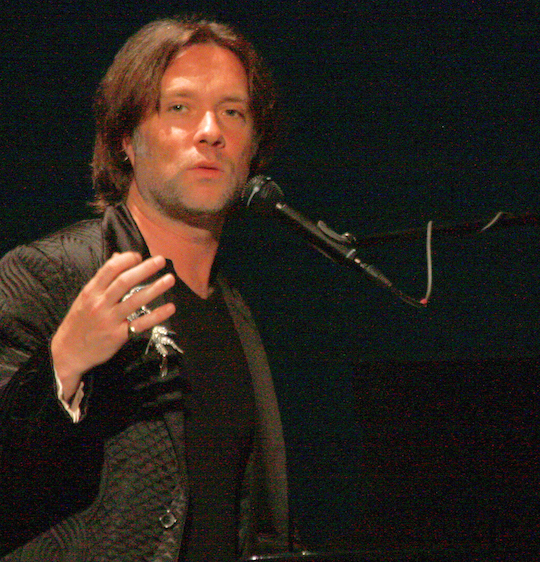
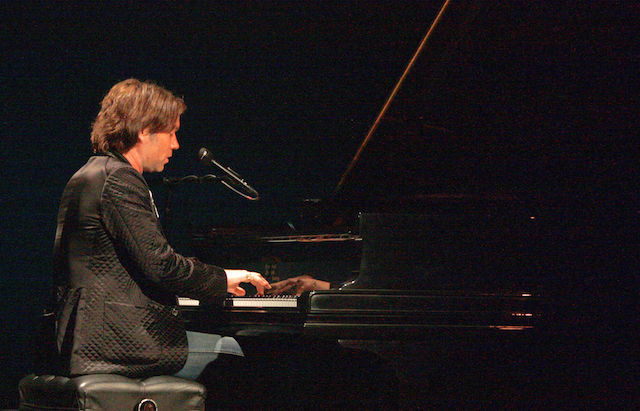
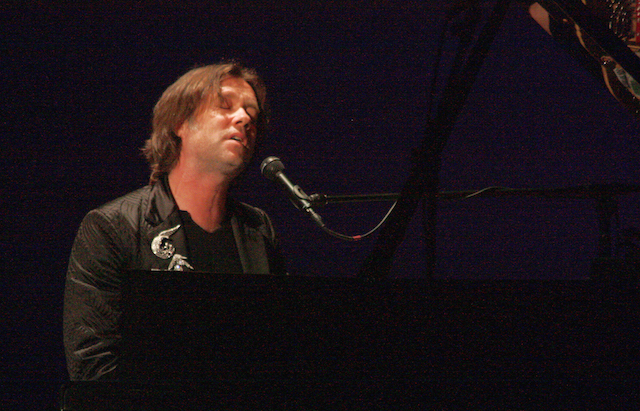

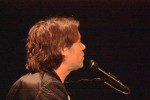
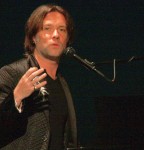


1 comment for “(Concert Review) Rufus Wainwright, Mahaiwe, 5.9.15”